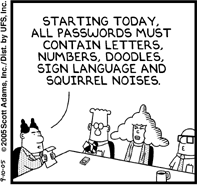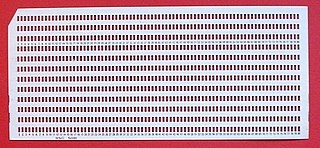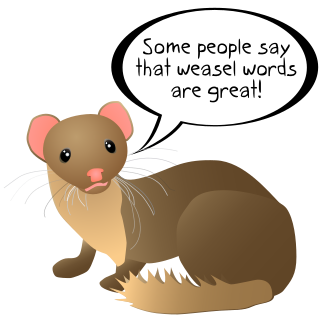
Dilbert is an American comic strip written and illustrated by Scott Adams, first published on April 16, 1989. It is known for its satirical office humor about a white-collar, micromanaged office with engineer Dilbert as the title character. It has led to dozens of books, an animated television series, a video game, and hundreds of themed merchandise items. Dilbert Future and The Joy of Work are among the best-selling books in the series. In 1997, Adams received the National Cartoonists Society Reuben Award and the Newspaper Comic Strip Award for his work. Dilbert appears online and as of 2013 was published daily in 2,000 newspapers in 65 countries and 25 languages.

Scott Raymond Adams is an American author and cartoonist. He is the creator of the Dilbert comic strip, and the author of several nonfiction works of business, commentary, and satire. Adams worked in various clerical roles before he became a full-time cartoonist in 1995. While working at Pacific Bell in 1989, Adams created Dilbert; by the mid-1990s the strip had gained national prominence in America and began to reach a worldwide audience. Dilbert remained popular throughout the following decades, spawning several books written by Adams and becoming a cultural touchstone until it was dropped from syndication. It now runs as a webcomic.

A sound card is an internal expansion card that provides input and output of audio signals to and from a computer under the control of computer programs. The term sound card is also applied to external audio interfaces used for professional audio applications.

Bullshit is a common English expletive which may be shortened to the euphemism bull or the initialism B.S. In British English, "bollocks" is a comparable expletive. It is mostly a slang term and a profanity which means "nonsense", especially as a rebuke in response to communication or actions viewed as deceptive, misleading, disingenuous, unfair or false. As with many expletives, the term can be used as an interjection, or as many other parts of speech, and can carry a wide variety of meanings. A person who excels at communicating nonsense on a given subject is sometimes referred to as a "bullshit artist" instead of a "liar".

A lace card is a punched card with all holes punched. They were mainly used as practical jokes to cause disruption in card readers. Card readers tended to jam when a lace card was inserted, as the resulting card had insufficient structural integrity to avoid buckling inside the mechanism. Card punchers could also jam trying to produce cards with all holes punched, owing to power-supply problems. When a lace card was fed through the reader, a card knife or card saw was needed to clear the jam.

A buzzword is a word or phrase, new or already existing, that becomes popular for a period of time. Buzzwords often derive from technical terms yet often have much of the original technical meaning removed through fashionable use, being simply used to impress others. Some buzzwords retain their true technical meaning when used in the correct contexts, for example artificial intelligence. Buzzwords often originate in jargon, acronyms, or neologisms. Examples of overworked business buzzwords include synergy, vertical, dynamic, cyber and strategy.

In the United States and Canada, bingo is a game of chance in which each player matches the numbers printed in different arrangements on cards. The game host draws balls at random, marking the selected numbers with tiles. When a player finds that the selected numbers are arranged on their card in a horizontal, vertical, or diagonal line, they call out "Bingo!" to alert all participants to a winning card, which prompts the game host to examine the card for verification of the win. Players compete against one another to be the first to have a winning arrangement for the prize or jackpot. After a winner is declared, the players clear their number cards of the tiles and the game host begins a new round of play.

The Tech Model Railroad Club (TMRC) is a student organization at the Massachusetts Institute of Technology (MIT). Historically, it has been a wellspring of hacker culture and the oldest such hacking group in North America. Formed in 1946, its HO scale layout specializes in the automated operation of model trains.

In rhetoric, a weasel word, or anonymous authority, is a word and/or phrase aimed at creating an impression that something specific and meaningful has been said, when in fact only a vague, ambiguous, or irrelevant claim has been communicated. The terms may be considered informal. Examples include the phrases "some people say", "it is thought", and "researchers believe". Using weasel words may allow one to later deny any specific meaning if the statement is challenged, because the statement was never specific in the first place. Weasel words can be a form of tergiversation and may be used in advertising, popular science, opinion pieces and political statements to mislead or disguise a biased view or unsubstantiated claim.

In computer jargon, blinkenlights are diagnostic lights on front panels of old mainframe computers. More recently the term applies to status lights of modern network hardware. Blinkenlights disappeared from more recent computers for a number of reasons, the most important being the fact that with faster CPUs a human can no longer interpret the processes in the computer on the fly. Though more sophisticated UI mechanisms have since been developed, blinkenlights may still be present as additional status indicators and familiar skeuomorphs.
In the technology industry, buzzword compliant is a tongue-in-cheek expression used to suggest that a particular product supports features simply because they are currently fashionable.

Dilbert is a fictional character and the main character and protagonist of the comic strip of the same name, created by Scott Adams. The character has ideas which are typically sensible and occasionally even revolutionary, but they are rarely pursued because he is powerless. He is frustrated by the incompetence and malevolence of his co-workers and often is sarcastic and snide. He was voiced by Daniel Stern in the television show.
CPU Wars is an underground comic strip by Charles Andres that circulated around Digital Equipment Corporation and other computer manufacturers starting in 1977. It described a hypothetical invasion of Digital's slightly disguised Maynard, Massachusetts ex-woolen mill headquarters by troops from IPM, the Impossible to Program Machine Corporation in a rather-blunt-edged parody of IBM. The humor hinged on the differences in style and culture between the invading forces of IPM and the laid-back employees of the Human Equipment Corporation. For example, even at gunpoint, the employees were unable to lead the invading forces to their leaders because they had no specific leaders as a result their corporation's use of matrix management.

Hacks at the Massachusetts Institute of Technology are practical jokes and pranks meant to prominently demonstrate technical aptitude and cleverness, and/or to commemorate popular culture and historical topics. The pranks are anonymously installed at night by hackers, usually, but not exclusively, undergraduate students. The hackers' actions are governed by an informal yet extensive body of precedent, tradition and ethics. Hacks can occur anywhere across campus, and occasionally off campus; many make use of the iconic Great Dome, Little Dome, Green Building tower, or other prominent architectural features of the MIT campus. Well-known hacker alumni include Nobel Laureates Richard P. Feynman and George F. Smoot. In October 2009, US President Barack Obama made a reference to the MIT hacking tradition during an on-campus speech about clean energy.
Corporate jargon is the jargon often used in large corporations, bureaucracies, and similar workplaces. The language register of the term is generally being presented in a negative light or disapprovingly. It is often considered to be needlessly obscure or, alternatively, used to disguise an absence of information. Its use in corporations and other large organisations has been widely noted in media.
The Jargon File is a glossary and usage dictionary of slang used by computer programmers. The original Jargon File was a collection of terms from technical cultures such as the MIT AI Lab, the Stanford AI Lab (SAIL) and others of the old ARPANET AI/LISP/PDP-10 communities, including Bolt, Beranek and Newman, Carnegie Mellon University, and Worcester Polytechnic Institute. It was published in paperback form in 1983 as The Hacker's Dictionary, revised in 1991 as The New Hacker's Dictionary.
Computer humour, also known as hacker humour, is humour on the subject of computers or their users.

Geeks & Greeks is a semi-autobiographical graphic novel written by humorist Steve Altes, illustrated by Andy Fish, and colored by Veronica Fish. It includes a foreword by novelist Matthew Pearl and is dedicated to Sean Collier. Geeks & Greeks is set at the Massachusetts Institute of Technology and locations in Boston, Cambridge, and the Quincy Quarries. The story was inspired by MIT's hacking culture and the writer's experiences with fraternity hazing. At MIT a hack is a clever, benign prank or unsanctioned public display or installation that requires technical sophistication to execute and often incorporates an offbeat sense of humor. Geeks & Greeks has been described as Good Will Hunting meets Animal House.













